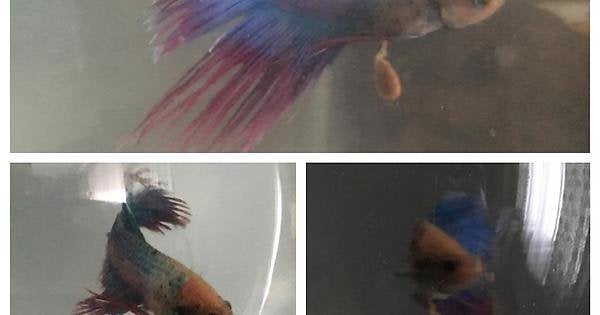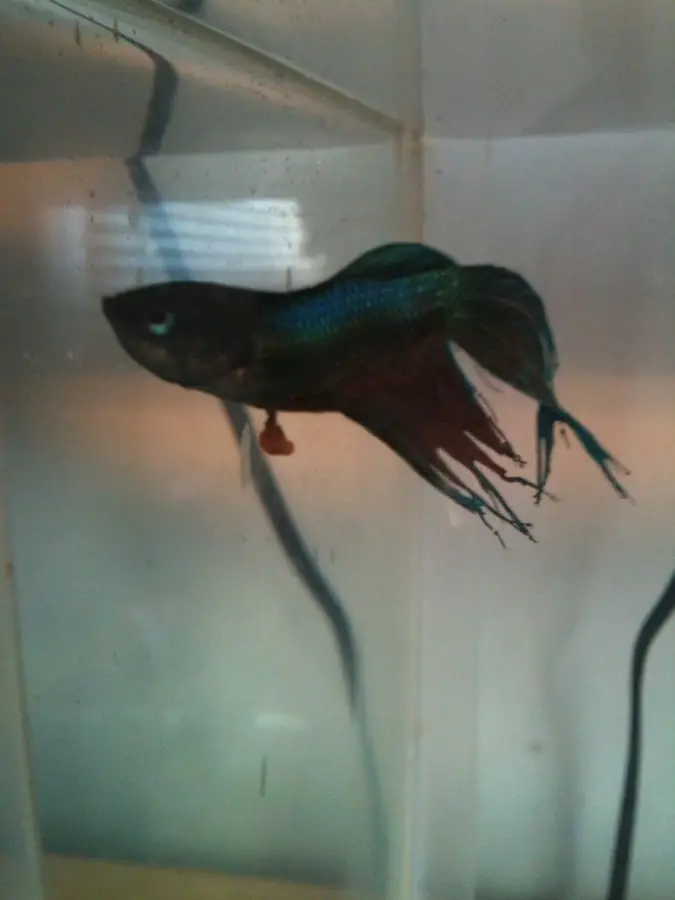Originally posted on May 20, 2023 @ 6:00 pm
Last Updated on 4 weeks by admin
Betta fish are popular pets, known for their vibrant colors and striking personalities. However, these beautiful creatures can sometimes experience health issues that require immediate attention. One of the most common and alarming problems is when a Betta fish’s intestines start to protrude from its body, which can be a sign of serious illness or injury.
If you are a Betta fish owner, it is essential to know how to handle this situation effectively. In this article, we will discuss the possible causes of Betta fish’s intestines hanging out, the symptoms to look out for, and the steps you can take to help your fish recover. So, if you want to ensure the health and well-being of your beloved Betta fish, keep reading to learn more!
If your Betta fish’s intestines are hanging out, it’s likely they have a condition called “prolapsed cloaca.” This can be caused by constipation, injury, or infection. To treat it, isolate the fish in a small container with clean, warm water. Add aquarium salt and a few drops of Bettafix to the water. Feed the fish a high-fiber diet and keep the water clean. If the condition persists, consult a veterinarian.

Dealing with Betta Fish Intestines Hanging Out
Betta fish, also known as Siamese fighting fish, are one of the most popular aquarium fish around the world. They are known for their vibrant colors, long fins, and aggressive behavior. However, betta fish are also prone to various health issues, including gut-related problems. One of the most alarming issues that betta fish owners may encounter is when the betta fish’s intestines hang out. This condition is called “prolapsed cloaca,” and it can be life-threatening for the fish. In this article, we will discuss how to deal with betta fish intestines hanging out.
What Causes Betta Fish Intestines to Hang Out?
Most often, prolapsed cloaca occurs when the fish is constipated. Constipation in betta fish can be caused by overfeeding, feeding an improper diet, or not providing enough fiber in their diet. Constipation causes the fish’s intestines to expand and push against the cloaca, which is the opening where the fish’s waste is expelled. The pressure can cause the cloaca to become irritated and inflamed, leading to the prolapse of the fish’s intestines.
How to Prevent Constipation in Betta Fish
Preventing constipation in betta fish is the first step in avoiding the prolapse of the fish’s intestines. Here are some tips to help keep your betta fish healthy and well-fed:
- Feed your betta fish a high-quality diet that is rich in fiber.
- Avoid overfeeding your betta fish. A general rule of thumb is to feed them only what they can eat in 2-3 minutes, twice a day.
- Consider adding some live or frozen foods to your betta fish’s diet, such as brine shrimp or bloodworms. These foods are rich in fiber and can help keep your betta fish’s digestive system healthy.
- Make sure the water in your betta fish’s tank is clean and well-maintained. Poor water quality can lead to constipation and other health issues.
What to Do When Betta Fish Intestines Hang Out?
If you notice that your betta fish’s intestines are hanging out, it’s essential to act quickly. Leaving the prolapse untreated can lead to infection and even death. Here are some steps to follow when dealing with prolapsed cloaca in betta fish:
Step 1: Isolate the Fish
The first step is to isolate the fish in a separate tank or container. This will help prevent other fish from picking at the prolapse and causing further damage. Make sure the isolation tank is clean and filled with fresh, clean water.
Step 2: Assess the Damage
Carefully examine the prolapse to determine the extent of the damage. If the prolapse is mild, you may be able to gently push the intestines back into the fish’s body. Use clean, sterile tweezers or a cotton swab to gently push the intestines back in place.
Step 3: Treat the Fish
After pushing the intestines back into place, apply a topical antibiotic ointment to the prolapse. This will help prevent infection and promote healing. You can also add aquarium salt to the water to help reduce inflammation and promote healing.
Step 4: Monitor the Fish
Keep a close eye on the fish and monitor it for any signs of infection or further prolapse. If the prolapse does not resolve within a few days or if the fish shows signs of infection, such as redness or swelling, consult a veterinarian who specializes in fish.
Conclusion: Benefits of Proper Betta Fish Care
Taking proper care of your betta fish is essential to maintaining their health and well-being. Proper feeding and water maintenance can help prevent constipation and other gut-related issues that can lead to prolapsed cloaca. If you do notice that your betta fish’s intestines are hanging out, act quickly and follow the steps outlined above to treat the prolapse and promote healing. By providing your betta fish with the proper care and attention they need, you can enjoy their beauty and companionship for years to come.
Frequently Asked Questions
In this section, we have compiled some frequently asked questions about dealing with Betta fish intestines hanging out. Read on to learn more about this common Betta fish health issue.
What are the causes of Betta fish intestines hanging out?
Betta fish intestines hanging out is a common health issue that can be caused by various factors. Some of the most common causes include overfeeding, constipation, bacterial infections, and physical injuries. Overfeeding can cause constipation, which can lead to the swelling of the intestines. Bacterial infections and physical injuries can also cause the intestines to protrude from the fish’s anus.
To prevent Betta fish intestines from hanging out, it is important to maintain a healthy and balanced diet for your fish. Avoid overfeeding and make sure to provide a varied diet that includes protein-rich foods. It is also important to keep the tank clean and free from harmful bacteria.
How can I tell if my Betta fish has intestines hanging out?
The most obvious sign that your Betta fish has intestines hanging out is the presence of a pink, fleshy protrusion from the fish’s anus. This protrusion can range from a small bump to a large mass depending on the severity of the condition. You may also notice that your fish is lethargic, has a loss of appetite, and is swimming abnormally.
If you suspect that your Betta fish has intestines hanging out, it is important to take action immediately. Consult with a veterinarian or a fish expert to determine the best course of action to treat the condition.
What is the treatment for Betta fish intestines hanging out?
The treatment for Betta fish intestines hanging out depends on the severity of the condition. In mild cases, the condition can be treated by changing the fish’s diet and providing a laxative to help ease constipation. In more severe cases, surgery may be necessary to remove the protruding intestines and repair any internal damage.
If you suspect that your Betta fish has intestines hanging out, it is important to consult with a veterinarian or a fish expert to determine the best course of treatment for your fish.
How can I prevent Betta fish intestines from hanging out?
Preventing Betta fish intestines from hanging out is relatively simple. The most important thing is to maintain a healthy and balanced diet for your fish. Avoid overfeeding and provide a varied diet that includes protein-rich foods. It is also important to keep the tank clean and free from harmful bacteria.
Regular water changes and tank maintenance can help prevent bacterial infections and other health issues that can lead to Betta fish intestines hanging out. Finally, it is important to monitor your fish closely and seek medical attention immediately if you notice any signs of illness.
Can Betta fish recover from intestines hanging out?
Whether or not Betta fish can recover from intestines hanging out depends on the severity of the condition and the promptness of treatment. In mild cases, the condition can be treated with changes to the fish’s diet and the use of laxatives to ease constipation.
In more severe cases, surgery may be necessary to remove the protruding intestines and repair any internal damage. It is important to seek medical attention immediately if you suspect that your Betta fish has intestines hanging out to ensure the best chance of recovery.

Treating fish with parasitic worms, fish stopped eating and has stringy white pooh.
In conclusion, dealing with Betta fish intestines hanging out can be a stressful and alarming situation for any fish owner. However, it’s important to remain calm and act quickly to ensure the best possible outcome for your fish.
Firstly, it’s important to isolate the fish in a separate tank with clean water to prevent any further damage or infection. Secondly, seek advice from a veterinarian or experienced fish owner to determine the best course of action for your particular situation. Lastly, ensure that the water conditions in the tank are optimal to aid in the healing process.
Remember, prevention is key when it comes to Betta fish health. Providing a proper diet, clean water, and a stress-free environment can help prevent many health issues, including intestinal prolapse. With proper care and attention, Betta fish can live long and healthy lives.
